LAHORE: One of the most frightening things about Pakistan’s blasphemy law is that the simplest act can spiral into charges that can bring the death penalty. In the case of Aasia Bibi, a Christian woman, it started when she brought water to her fellow women workers on a farm.
On that hot day in 2009, Bibi had a sip from the same container and some of the Muslim women became angry that a Christian had drunk from the same water. They demanded she convert, she refused. Five days later, a mob accused her of blasphemy. She was convicted and sentenced to death. Later this month, the Supreme Court is expected to hear her appeal.
Pakistan is under new international pressure to curb Islamic extremism, and activists at home say one place to start is by changing its blasphemy law.
In January, the US State Department cited the law as one of the reasons as it put Pakistan on a watch list of countries accused of “severe violations of religious freedoms.”
The move came as the Trump administration is ratcheting up pressure on Islamabad, freezing security aid until it cracks down on militant networks operating from its soil to carry out attacks in Afghanistan. Moreover, the Financial Action Task Force, an intergovernmental agency that combats money laundering and terror financing, has given Pakistan until June to show how it will tackle radicalism or else be put on a black list, a step that could hurt its international financial ties.
Opponents of the blasphemy law say it has turned into a force corroding Pakistani society, feeding extremism, implicating the justice system in radicalism and ultimately undermining rule of law.
Often the law is used to punish rivals in personal feuds. Just making an accusation is enough to convince neighbors or others in the community that the defendant is guilty and must be punished, whipping up a vengeful anger even if the courts find the accused innocent. Authorities are often too afraid to push back against the public fury. In at least one case, officials have kept a man acquitted of blasphemy in prison, fearing riots if he is freed.
Militant groups have embraced the law, using it to cultivate support and attack those who try to break their power.
“It has become much more dangerous over the last few years. The reason is that they have created a sense of fear,” said Zahid Hussain, a political analyst and the author of two books on militancy in Pakistan. “It has become a ready tool not only against non-Muslims, but also against Muslims, who do not agree with their world view.”
According to the US Commission on International Religious Freedom, 71 countries have blasphemy laws — around a quarter of them are in the Middle East and North Africa and around a fifth are European countries, though enforcement and punishment varies.
Pakistan is one of the most ferocious enforcers.
At least 1,472 people were charged under Pakistan’s blasphemy laws between 1987 and 2016, according to statistics collected by the Center for Social Justice, a Lahore-based advocacy group. Of those, 730 were Muslims, 501 were Ahmedis — a sect that is reviled by mainstream Muslims as heretics — while 205 were Christians and 26 were Hindus. The center said it didn’t know the religion of the final 10 because they were killed by vigilantes before they could get their day in court.
While Pakistan’s law carries the death penalty and offenders have been sentenced to death, so far no one has ever been executed.
A key test will come when Pakistan’s Supreme Court rules on the case of Aasia, whose world was turned upside down after a mob of villagers accused her of insulting Islam and the Prophet Muhammad after the water incident.
Aasia’s case even reached the Vatican, where Pope Francis last month met with her husband, Ashiq Masih, and daughter Eisham, who traveled to Rome to witness the Colosseum being bathed in red light in a sign of solidarity with persecuted Christians around the world.
During the emotional encounter, Eisham gave the pope a kiss that she said her mother asked her to deliver.
“The blasphemy law is misused in Pakistan,” Masih told The Associated Press in a rare interview. “It has nothing to do with the Holy Prophet or Islam, it is just to settle grudges.”
He spoke at a small Christian-run school in Lahore which Eisham and a younger, disabled daughter, attend. The school’s principal and owner, Joseph Nadeem, has become a guardian to Masih and his children.
Masih, who said his wife was innocent, points to his arm where a bullet struck him, fired by a protester outraged with his wife’s alleged crime. He never lives in one location too long, because it is potentially dangerous, he said.
Aasia’s lawyer, Saiful Malook fears the Supreme Court will buckle to extremists’ pressure and reject his client’s appeal when it hears it later this month. Her only hope in that case would be a presidential pardon, he said.
Just defending her is dangerous. Malook’s home in Lahore is protected by police. He also is a target because he prosecuted Mumtaz Qadri, the elite police guard who killed Punjab’s provincial governor, Salman Taseer, in 2011, after Taseer defended Aasia Bibi and criticized the misuse of the blasphemy law.
Qadri was hanged for his crime, but he has since become a martyr to millions, who make a pilgrimage to a shrine erected in his name by his family outside the federal capital. Giant posters of Qadri emblazon buildings not far from the school where The AP interviewed Aasia Bibi’s husband.
Fear of being connected with a blasphemy case is so strong that Nasreen Abid, a Christian woman, moved out of earshot of others and whispered as she told the AP her family’s story. She spoke outside Lahore’s Mayo Hospital, where she was waiting to learn the condition of her son, Sajjid, who suffered multiple injuries, including two broken legs, after he jumped from a third-story window of a police investigation unit.
She said the police called in Sajjid after his cousin, Patras Masih, was arrested on accusations of sharing a blasphemous picture on Facebook. Police wanted to check Sajjid’s phone but found nothing, said his mother.
Then police stripped Sajjid and his cousin, taunted them and told them to have sex with each other, she said. Instead, her son flung himself out the window. Police say they are investigating the incident.
“There shouldn’t be this law,” Abid said. “Now look at us. We shouldn’t be treated like this. We are citizens of Pakistan. We are being treated wrongly because we are poor and we are weak.”
In Jand Wala Saroo, a small village near Pakistan’s border with India, Razia Bibi wonders whether she will ever again see her brother, Muhammad Mansha.
Mansha spent nine years in jail accused of blasphemy until the Supreme Court acquitted him last year, saying the evidence was insufficient. But he remains imprisoned because authorities say his release would start a riot in the village.
“I pray the village will forgive him, but no one wants him back here,” Razia said, sitting on a traditional rope bed surrounded by her many children. “All the villagers are agreed. He shouldn’t come back. Some even said they would kill him.”
Two local men accused Mansha of destroying pages of the Qur’an at a mosque, though neither witnessed the alleged act. The only purported witness was a child who can neither hear nor speak.
One of the complainants, Allah Ditta Nadeem, told the AP he was at home when people came and told him what had happened. He said he then went to the mosque, where the child explained with hand gestures. Still, Nadeem said he was convinced of Mansha’s guilt.
Hussain, the analyst and author, said most Pakistani politicians privately acknowledge the need to change the law, but are too afraid. Also they often use religious groups when they need them to win elections.
“Neither the military nor the civilian government has a clear strategy how to deal with extremism or militancy in this country,” said Hussain. “For me this is the biggest existential threat to Pakistan because if extremism is not controlled or contained . . . it is going to destroy the social fabric of this country.”
Pakistan under pressure to rein in blasphemy law
Pakistan under pressure to rein in blasphemy law
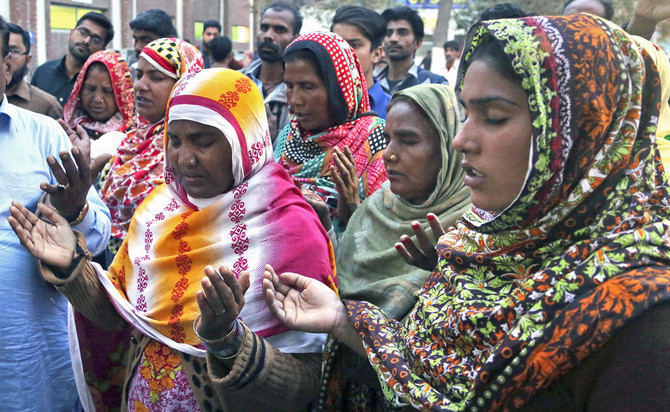
Pakistan considers Chinese nationals’ security its ‘core responsibility,’ says interior minister
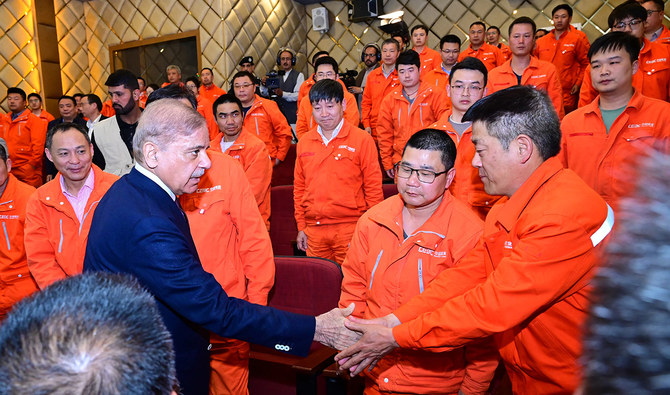
- Pakistan’s Interior Minister Mohsin Naqvi meets Chinese Consul General Zhao Shiren in Islamabad
- A suicide attack in northwestern Pakistan last month killed five Chinese engineers and a Pakistani
ISLAMABAD: Interior Minister Mohsin Naqvi this week assured China’s consul general that the security of Chinese nationals in the South Asian country is Pakistan’s “core responsibility,” state-run Associated Press of Pakistan (APP) said, as Islamabad looks to bolster security of foreign nationals amid a surge in attacks.
Pakistan says it has taken steps to enhance Chinese nationals’ security in the country after a suicide bomber last month attacked a convoy of Chinese engineers working on a hydropower project in the northwestern town of Dasu. Five Chinese engineers and their Pakistani driver were killed in the attack.
The attack was the third major one in a little over a week on China’s interests in the South Asian nation, where Beijing has invested over $65 billion in energy, infrastructure and other projects as part of its wider Belt and Road initiative.
“Chinese nationals’ safety is our core responsibility, instructions have been issued to the concerned agencies to ensure the safety of Chinese citizens,” Naqvi told Chinese Consul General Zhao Shiren during a meeting in Islamabad on Saturday.
“The minister informed about the measures taken about the security of Chinese citizens, adding that it is our national responsibility.”
The minister assured Shiren that Pakistani authorities would not allow conspiracies to harm Pakistan’s friendship with China.
Meanwhile, the Chinese envoy said the two countries were all-weather friends.
Chinese interests in Pakistan’s southwestern Balochistan province have also been under attack primarily by the militants, who seek to push Beijing out of the mineral-rich territory.
Pakistan is home to an insurgency launched by ethnic Baloch separatists who seek secession from the central government in the country, blaming it for the inequitable division of natural resources in the southwestern Balochistan province. The government denies this.
Nadal gets even with De Minaur at Madrid Open but still doubts his body can hold up at French Open

- Nadal is no longer aiming to add to his 92 career titles after being decimated by injuries in recent years
- Top-seeded Jannik Sinner and Iga Swiatek brushed aside their first opponents
MADRID: Rafael Nadal tore his headband off, thrust his arms in the air, and soaked up the cheers. It was only a second-round win, but coming from where Nadal had been just a few weeks ago when he couldn’t even get on the court, he could have been savoring a trophy.
He had just beaten 11th-ranked Alex de Minaur 7-6 (6), 6-3 at the Madrid Open on Saturday, avenging a straight-set loss to the Australian less than two weeks ago.
Nadal is no longer aiming to add to his 92 career titles after being decimated by injuries in recent years. The 37-year-old just wants to play like Rafael Nadal, or as close to that as he can. So he is going forward game by game, measuring his efforts to avoid an injury that would likely force his definitive retirement, with the ultimate goal of being competitive one more time at next month’s French Open.
“I have been through some very difficult months when there were moments when I didn’t see the reason to continue, but I had the dream of experiencing feelings like this again and above all at home,” Nadal said. “It was incredible.”
The 22-time Grand Slam champion was cheered on by Spanish King Felipe VI, soccer great Zinedine Zidane and a raucous crowd that packed the Caja Magica to see what will most likely be the tennis great’s last tournament in Spain.
Nadal was playing just his fourth competitive match since his latest injury layoff in his farewell season.
De Minaur beat Nadal just 11 days before in Barcelona, where the Spaniard returned to the courts for the first time in more than three months. Nadal looked much better this time around.
But Nadal said being ready to play at Roland Garros, with its more demanding five-set format, is another matter, especially given the importance he has for the tournament he has won 14 times.
“Roland Garros is the most important tournament of my tennis career, and all the things that I lived there, enjoyed there, stay in my heart forever,” he said.
“So if I am not able to go on court and dream, even if it’s the minimum, minimum percentage, (then) for me doesn’t make sense to go on court. I’d prefer to stay with all the amazing memories that I have. I want to be there, and even losing, but, you know, to go on court with the chance to dream about something important.”
Nadal got a straight-set win over American teenager Darwin Blanch on Thursday, but De Minaur was much stiffer competition and the tension in the stands of Manolo Santana Stadium was palpable.
The first set saw both players break serve twice. De Minaur then saved four set points before Nadal finished him off in the tiebreak to take the lead. Nadal pressed his advantage, broke De Minaur’s first service game of the second set and closed out the victory.
“I’m super happy to be able to be competitive against a great player like Alex, play over two hours,” Nadal said after his first win over a top-20 opponent since 2022. “It means a lot to me and the atmosphere here is just a joke, so I can’t thank enough everybody here.”
Nothing less than sports royalty in his Spain, Nadal grunted out his first “Vamos!” (Let’s go!), more to himself than his staff or fans, after winning his first point. He pumped his fists after landing his hammer of a left-hand drive; he argued heatedly with the chair judge over whether or not he challenged a line call on time; he shook his head when he hit long, chiding himself for not adjusting to Madrid’s high altitude.
And the crowd ate it up, shouting “Viva Rafa!” between points and “Ole! Ole! Ole!” after his backhand winner set up match point. De Minaur double-faulted to do himself in.
Nadal has won a record five times in Madrid, the last time in 2017.
Next up will he face Pedro Cachin in the third round after the Argentine beat Frances Tiafoe 7-6 (1), 3-6, 6-4.
TOP SEEDS ADVANCE
Top-seeded Jannik Sinner and Iga Swiatek brushed aside their first opponents.
Sinner downed fellow Italian Lorenzo Sonego 6-0, 6-3 in the second round to improve to 5-0 against his countryman.
Third-seeded Daniil Medvedev rallied past Matteo Arnaldi 2-6, 6-4, 6-4, while fifth-seeded Casper Ruud beat Miomir Kecmanovic 6-4, 6-1.
The seventh-ranked Stefanos Tsitsipas was upset 6-4, 6-4 by Brazilian qualifier Thiago Monteiro, ranked 118th. Tsitsipas won Monte Carlo this month before reaching the final of Barcelona last week.
Grigor Dimitrov, seeded ninth, lost to Jakub Mensik 6-2, 6-7 (4), 6-3, while Felix Auger-Aliassime, Sebastian Korda, Ben Shelton, and Alexander Bublik were among players who won.
Swiatek made quick work of Sorana Cirstea 6-1, 6-1 to reach the women’s last 16.
The top-ranked Swiatek, who lost last year’s final to Aryna Sabalenka, improved her record this season to 26-4. She will next face Sara Sorribes Tormo on Monday after the Spaniard ousted Victoria Azarenka 7-6 (0), 6-3.
Coco Gauff, seeded third, downed Dayana Yastremska 6-4, 6-1 and will next face Madison Keys.
The 2022 winner Ons Jabeur, Maria Sakkari, Jelena Ostapenko — all top-10 players — also advanced.
Interest in hosting Olympics ‘never so high,’ says IOC boss
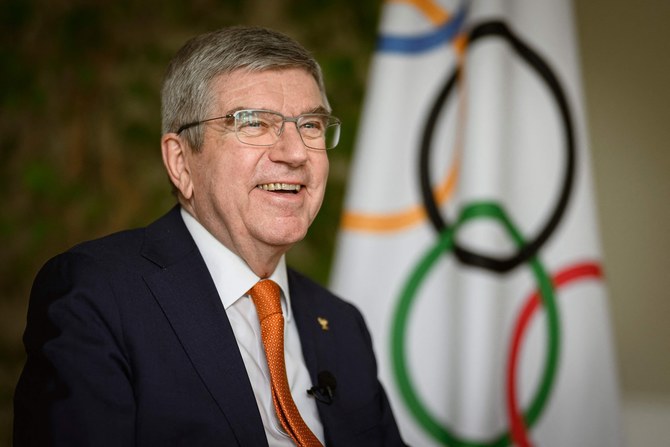
- After a string of Games in Western democracies, 2036 could be an opportunity for Saudi Arabia, sole candidate for the 2032 FIFA World Cup; Qatar, a losing candidate for 2032; Indonesia, or India
- Bach attributes the revival of interest in hosting the Olympics to reforms undertaken on his watch
LAUSANNE: Despite threats from climate change, AI-enhanced doping or competition from e-sports, the boss of the International Olympic Committee believes the future has never looked so bright for his sports movement.
Thomas Bach, a 70-year-old German fencer, has run the Switzerland-based guardian of the Olympic Games since 2013 when interest in hosting the event was near rock-bottom after repeated scandals over costs and corruption.
Its diminished appeal was clear at the time of bidding for the 2024 and 2028 Summer Olympics when there were only two candidates, Paris and Los Angeles, who divided the honors between themselves.
Since then, the 2032 Games have been awarded to Brisbane, Australia, and Bach told AFP in an interview at IOC headquarters on Friday that there were “double-digit” numbers of countries in the running for 2036.
“We have never been in such a favorable position. We have never seen such a high interest in hosting the Olympic Games,” he said on Friday from his offices that overlook Lake Geneva.
After a string of Games in Western democracies, 2036 could be an opportunity for Saudi Arabia, sole candidate for the 2032 FIFA World Cup; Qatar, a losing candidate for 2032; Indonesia, or India.
“We are now 12 years away from these Games, so it is way too early to comment on any of these interests,” Bach replied when asked about Saudi Arabia and Qatar.
Bach attributes the revival of interest in hosting the Olympics to reforms undertaken on his watch, which have sought to put an end to the wasteful spending that has near-bankrupted several host cities in the past.
Instead of oversized and gleaming new stadiums and facilities that often fall empty afterwards, the IOC now encourages the use of existing or temporary infrastructure.
An estimated 96 percent of the sport during Paris 2024, which begins on July 26, will take place in existing or temporary locations, while LA 2028 might reach 100 percent.
“Paris is the first Olympic Games which is absolutely in line with our Olympic agenda reforms from start to finish,” Bach added.
As a result, French organizers claim that their event will be responsible for around half the carbon emissions of previous editions in London 2012 and Rio in 2016.
Critics, such as environmental research group Carbon Market Watch, commend the efforts to improve, but remain skeptical that the Games can ever be sustainable.
“The most significant factor affecting the games’ environmental footprint is its enormity,” a report from the group stated in mid-April.
Pakistan to conduct week-long polio vaccination drive in Sindh, KP from Apr. 29
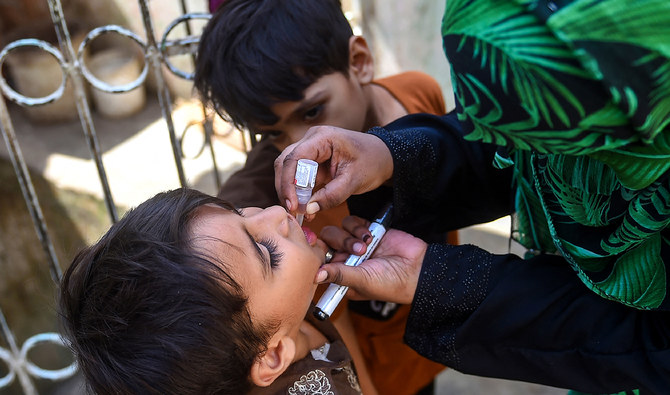
- Campaign to begin in 25 districts of Sindh, 13 districts of Khyber Pakhtunkhwa, says state media
- Eight million children in Sindh, 2.8 million in Khyber Pakhtunkhwa to be vaccinated during campaign
ISLAMABAD: The Pakistani government will conduct a week-long polio immunization program in the country’s northwestern Khyber Pakhtunkhwa and southern Sindh provinces from Apr. 29, the state-run Radio Pakistan reported on Sunday.
Pakistan and Afghanistan are the only two countries in the world where the poliovirus, which causes paralysis and can be a life-threatening disease, is endemic.
“A week-long National Immunization Campaign will begin in twenty-five districts of Sindh and thirteen districts of Khyber Pakhtunkhwa from tomorrow,” Radio Pakistan said in a report.
Chief Minister Sindh Syed Murad Ali Shah chaired a meeting of the Provincial Task Force for Eradication of Polio in Karachi on Saturday. Shah directed all district administrations to cooperate with the polio teams and make the drive successful, the report said.
“The meeting was informed that around eight million children up to the age of five years would be administered anti-polio vaccines during the campaign,” the report said.
Meanwhile, over 2.8 million children will be administered anti-polio drops during the drive, the Khyber Pakhtunkhwa Emergency Operation Center said.
“Twenty-one thousand teams have been constituted for this purpose,” the report added.
Pakistan’s efforts to contain polio have often been met with opposition, especially in the country’s northwestern KP province, where militants have carried out attacks against vaccinators and the security teams guarding them.
Many believe in the conspiracy theory that polio vaccines are part of a plot by Western outsiders to sterilize Pakistan’s population.
Pakistani masses’ doubts regarding polio campaigns were exacerbated in 2011 when the US Central Intelligence Agency set up a fake hepatitis vaccination program to gather intelligence on former Al-Qaeda chief Osama bin Laden.
Six-day ‘Study in Dubai’ fair highlights UAE’s growing appeal to Pakistani students
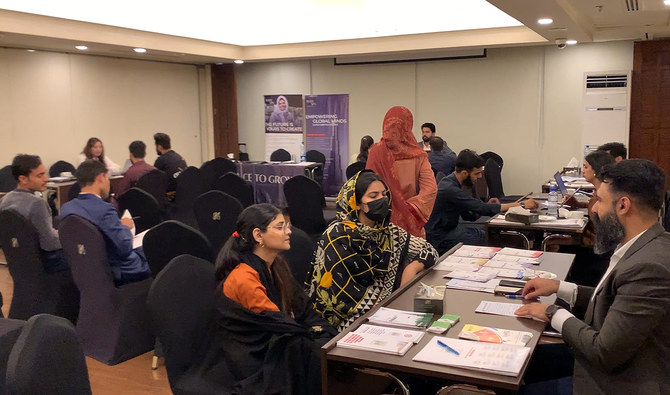
- Foreign student enrollment has increased in Dubai since the launch of its education policy over six years ago
- Educational professionals say Dubai is competing with traditional destinations like the US, UK and Australia
ISLAMABAD: The United Arab Emirates (UAE) has gained traction as a major higher education destination for Pakistani students, university representatives and local admissions professionals noted this week, as the six-day “Study in Dubai” fair concluded in Lahore on Saturday after touring various cities.
Dubai has seen a significant increase in foreign student enrollments since the launch of the UAE National Strategy for Higher Education 2030 more than six years ago. UAE authorities reported this month international enrollments have risen by 25 percent since the 2022-23 academic year, including a seven percent increase among Pakistani students.
Education professionals believe Dubai is increasingly competing with traditional education destinations such as the United States, United Kingdom and Australia.
“What we have observed is that Pakistani students have started moving toward the Emirates,” Muhammad Shoaib told Arab News on Tuesday when the education fair was held in Rawalpindi.
“This is particularly because there have been some policy changes in the mainstream destinations, like Canada, Australia and the UK,” he continued. “Furthermore, we have seen that many reputable universities from the US, UK and Australia have started opening their campuses in Dubai.”
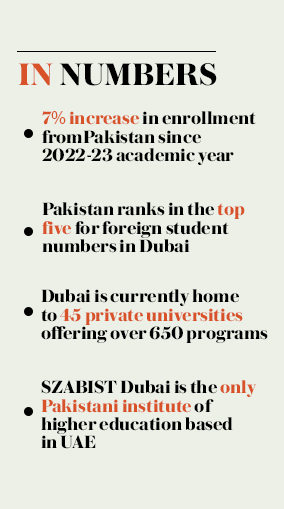
Dubai is currently home to 45 private universities offering over 650 programs, with degrees in business, engineering, information technology and media being the most sought-after among students.
Several top-ranking institutions of learning, including New York University, University of Birmingham, and Australia’s Curtin University, have opened their campuses there in recent years.
Wali-Ur-Rehman, the country manager for Curtin University’s Dubai campus in Pakistan, said the growth in international enrollment was due to increased postgraduate funding and greater job opportunities for those pursuing higher education in Dubai.
“We have seen a massive growth, from 2023 to 2024, of 40 percent [in terms of student applications] in the [Dubai] market, coming from Pakistan especially,” he said.
Daniyal Ahmed, a 19-year-old aspiring candidate for study in Dubai, described the UAE as an “ideal option” for him due to its proximity to Pakistan.
“Dubai has well-known universities now, like New York University and Khalifa University, which are performing quite well,” he said.
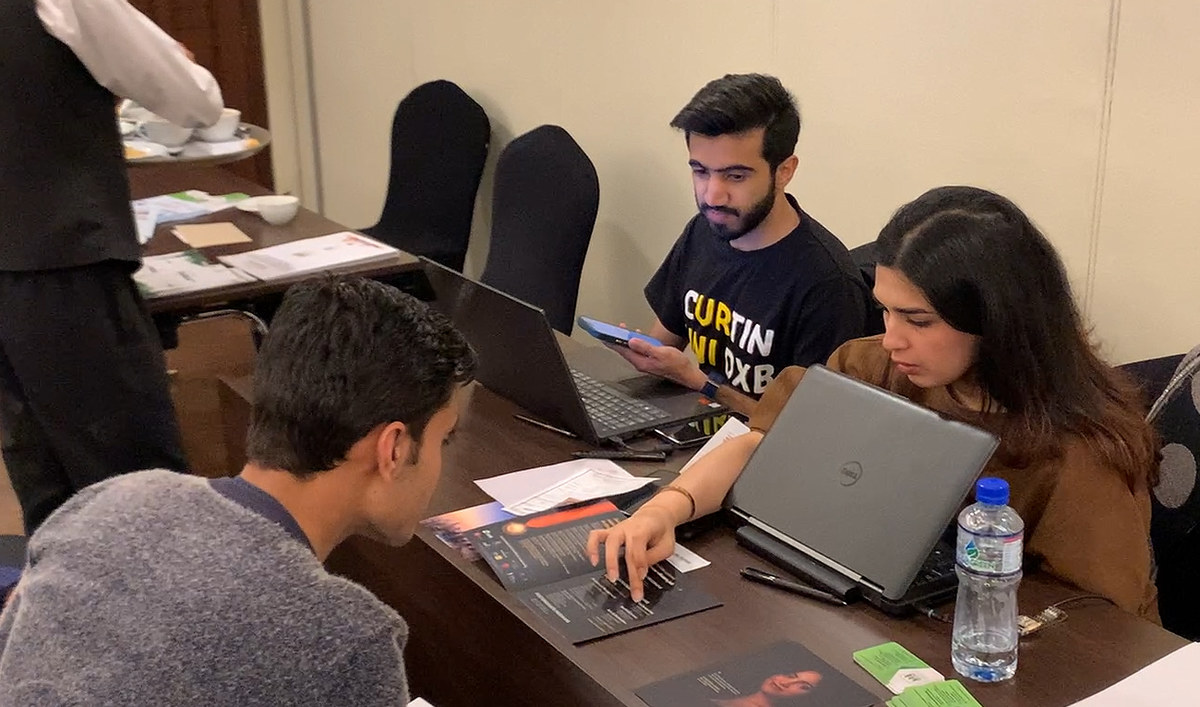
Asked about the traditional destinations preferred by students pursuing higher education, he said Pakistanis were beginning to face difficulties in securing visas to go to European universities.
Ahmed also mentioned Dubai’s education strategy, saying it included an expanded professional experience initiative, providing a variety of career training programs to students, such as on-campus work, job shadowing, joint ventures and vocational training.













